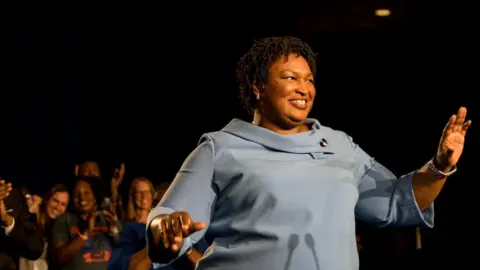Stacey Abrams: Georgia Democrat to respond to Trump State of the Union
 Getty Images
Getty ImagesStacey Abrams, a Democrat who narrowly lost the Georgia governor race in 2018, is set to respond to President Donald Trump's State of the Union speech.
She will deliver a televised rebuttal after Mr Trump's joint address to Congress on 5 February. His speech was delayed due to the government shutdown.
The opposition party traditionally responds to the president's annual message directly after the speech.
The Democratic rising star tweeted on Tuesday she was "honoured".
Allow X content?
Senate Minority Leader Chuck Schumer told reporters he invited Ms Abrams to deliver the response three weeks ago.
"She is just a great spokesperson," Mr Schumer said. "She's an incredible leader. She has led the charge for voting rights, which is at the root of just about everything else."
President Trump was due to deliver his annual remarks on Tuesday, but the event was postponed by a week over political gridlock that led to the longest ever closure of federal agencies, lasting 35 days.
Following Ms Abrams' remarks, California Attorney General Xavier Becerra will deliver the Democratic response in Spanish.
Who is Stacey Abrams?
Ms Abrams, 45, first gained national attention last year in her unsuccessful bid to become the nation's first black female governor.
The former minority leader of the Georgia state House of Representatives lost by fewer than 55,000 votes to Republican Brian Kemp, who at the time was Georgia's secretary of state.
Ms Abrams refused to concede victory after allegations of voter suppression, but later acknowledged Mr Kemp had won.
Since the election, which she attempted to challenge in court, she has attracted a major following among liberals, fuelling speculation that she may run against Georgia Republican Senator David Perdue in 2020.

Star power

Stacey Abrams may not have won her bid to be governor of Georgia, but the defeat - by 55,000 votes out of almost 4 million - hasn't dimmed her star power among Democrats.
She's reportedly being courted by party elders to run for Senate against Republican David Perdue next year. Now she'll have the opportunity to make a splash on the national stage.
By picking Ms Abrams, an avowed progressive, the Democratic leadership is reflecting the leftward shift the party has taken over the past few years. One of her trademark issues, voting rights, is the focus of the first major legislative push by Democrats in the House of Representatives.
Her choice also can be viewed as a long overdue acknowledgment that black women are a bedrock of Democratic support, whose voices should be promoted.
There's also the reality that Ms Abrams seems to be one of the few rising stars in the Democratic Party who isn't considering - or hasn't already announced - a run for the White House in 2020. Her choice keeps the already crowded presidential playing field level.

Ms Abrams has indicated that she is open to the possibility of running for office again.
"What I am trying to do is decide what's the right job, am I the right person and is this the right time," she told the Washington Post earlier this month.
Since November Ms Abrams has launched a new voting rights advocacy group, Fair Fight Georgia, which has filed a federal lawsuit against Georgia election officials for alleged mismanagement of the mid-term elections.
